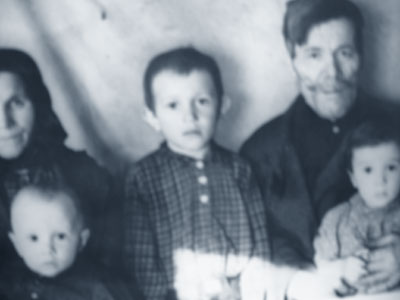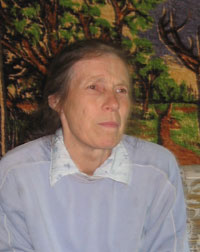









 Born 1926 in the village of Gnadenfeld, Eckheim District, Saratow Region.
Born 1926 in the village of Gnadenfeld, Eckheim District, Saratow Region.
Parents:
Mother Ц Maria Ivanovna, born 1903; she worked for the kolkhoz farm; died 1939.
Father Ц David Filippovich Arndt; kolkhoz worker, tractorist, engineer.
Fedor Davidovich just finished four terms in all, for he had to go to work from his early days, in order to help his parents earn a living.
The family (nine persons altogether) lived in a four-room house; its walls were made of bricks from smashed mud, the roof was made of wood.
In 1929 the grandparents were dispossessed, the cattle was taken away from them (two cows and four horses). They were forced to leave everything else behind; and then grandfather and grandmother were deported into different directions.
During the famine in 1933 they ate the meat of long-clawed ground squirrels. At first they boiled and then fried it. The fat was used to heal sick persons. The skins were delivered to some particular man on the kolkhoz, who would give them one rubel each in return.
It was a big kolkhoz farm; they cultivated grain and tobacco. In the village there were two kolkhoz farms, five brigades and some other farms, as well. The brigades were all exclusively engaged in farming.

Their kitchen garden was quite small. They just planted a paleful of potatoes, a couple of water melons and pumpkins.
During the last days of August 1941 their resettlement was announced publicly; they were conceded three days to pack their belongings. Everybody was informed about the ukase of August 28 concerning the forced resettlement of the Volga-Germans. They took along tools, roasted cutlets, flour and pearl barley.

Up to the station they went by hay carts, later by train, in freight cars; the floor was covered with hay. There was no toilet and there was no space where to sit down. During the trip the people did not receive any food, although they were en route for more than two months (more probably than not two weeks or one month? Ц A.B.). They received a warm meal only once Ц some kind of an undefinable brew or tea.
They arrived in Krasnoyarsk in the evening. Then they were to board a barge and went to Galanino. The trip took two days. They approached the little island of Galanino towards the morning; their ДbuyersУ were already waiting for them.
There was some kind of a chairman, who ДacquiredУ the entire Arndt family Ц he УboughtФ nine families in all. He was from the settlement of Vodorezovo.
Their family was housed with an old woman (grandma Olya). They lived there till the beginning of the new year (ten people in one room). The father got married.
Later they were allocated a little house. The elder brother was mobilized to the trudarmy at the age of 18. Afterwards they called up the father, as well.
The other villagers behaved quite well towards them. Kiryan Nesterovich Ripnikov, chairman of the kolkhoz farm, helped them at all points, with whatever he could. Of course they were always confronted with a hard daily routine, in spite of all helpfulness, for they were unable to speak Russian. They tried their best to make themselves understood by using their fingers, by sign language.
They attended the club regularly.
In return for their work the kolkhoz farm supplied them with , milk and bread; they also had the possibility tu buy these products, in case they disposed of money. Many a person sold her clothes or exchanged them against foodstuffs. The second year those who had saved their receipt about confiscated property and were able to present it with the autorities, received a cow and half a sack of wheat.
In 1947 the father went to Reshoty station, where he began to work as a lumberjack (he probably did not receive any permission to go there on his own initiative; presumably he was not talking about the year 1947, but about 1941, when they mobilized him to the labour army Ц at that time he was working for the timber industry of the Kraslag (felling trees), for sure. but maybe his trip was subject to some special order issued by the authorities, so that he betook himself to Reschoty actually in 1947 - AB).
They had to report and get registered with the commandantТs office twice a month..
In 1948 Fedor Davidovich enlisted for a period of three years and removed with his wife to Momotovo. His wife was a Chuvash Ц Anastasia Osipovna; she had removed with her parents to Vodorezovo. She died in1987.
There were two camps in Momotovo, where they used to keep former prisoners of war.
They never decided to return to their home village (on the river Volga), but they were told that there house was still there.
As from 1956 Fedor Davidovich was no longer forced to report and get registered with the authorities.
The fates of the brothers and sisters took different directions.
Х The elder brother died.
Х Another brother died in Chelnoky in 1942 due to debility caused by hard work .
Х The youngest brother (born in 1937) removed to Belorussia; he died there in
1988.
Х Another brother died in 2001.
Х The sister lives in Germany.
Х The stepmother died in 1986.
Fedor Davidovich has 3 children; presently his daughter lives with him.


Schoolphotos showing the Arndts - Svetlana Fedorovna Shestoperova

He does not judge the depressing incidents of his past as ounishment, but as inevitable sanctions. He says: УWe were children at that time and for that reason just followed our parents to the place they were going to.....У
Interviewed by Tatiana Dshnoyeva and I.N. Moiseyeva.
(AB Ц Comments by Aleksei Babiy, Krasnoyarsk ДMemorialУ
Sixth expedition of history and human rights, Momotovo 2009.


